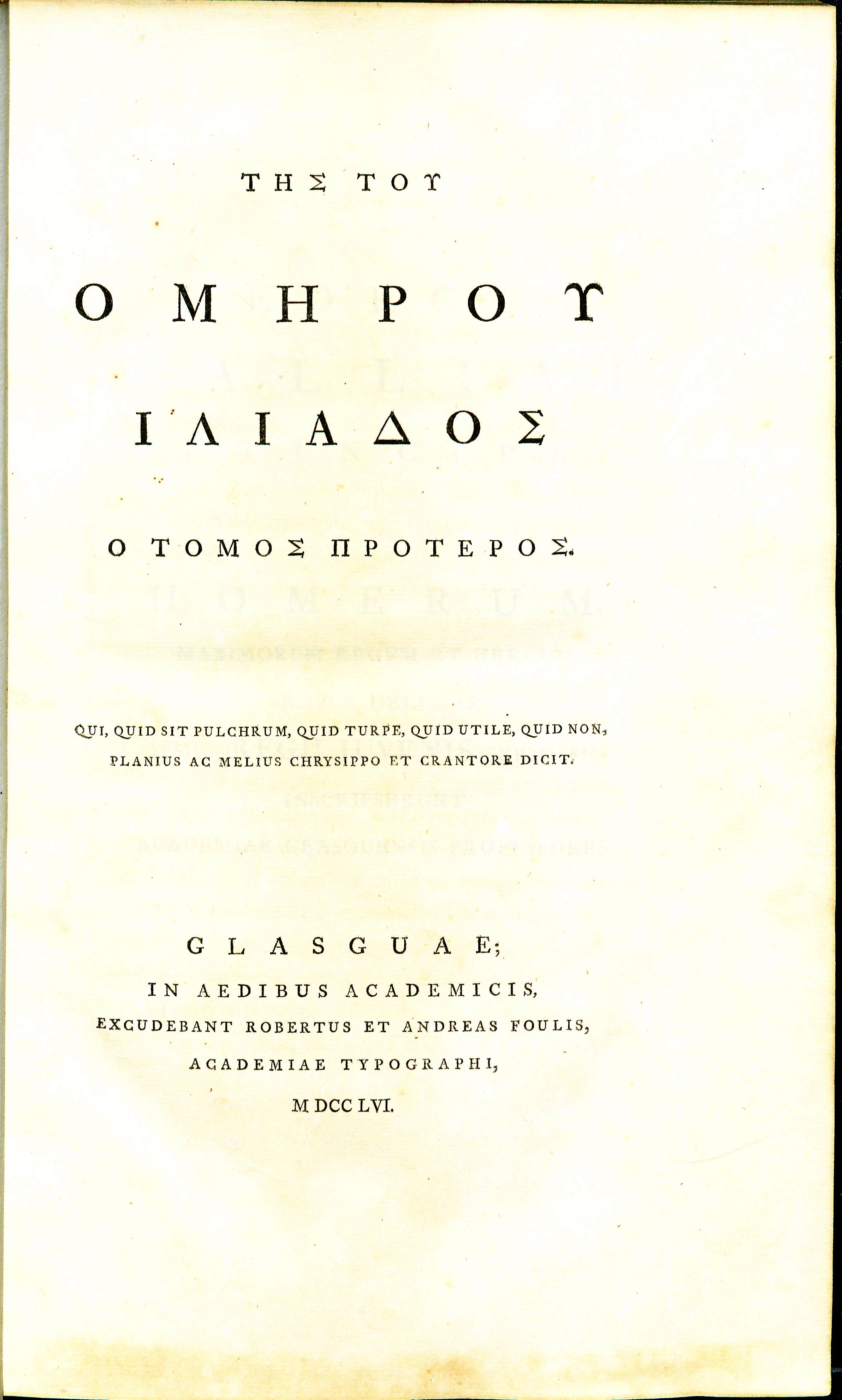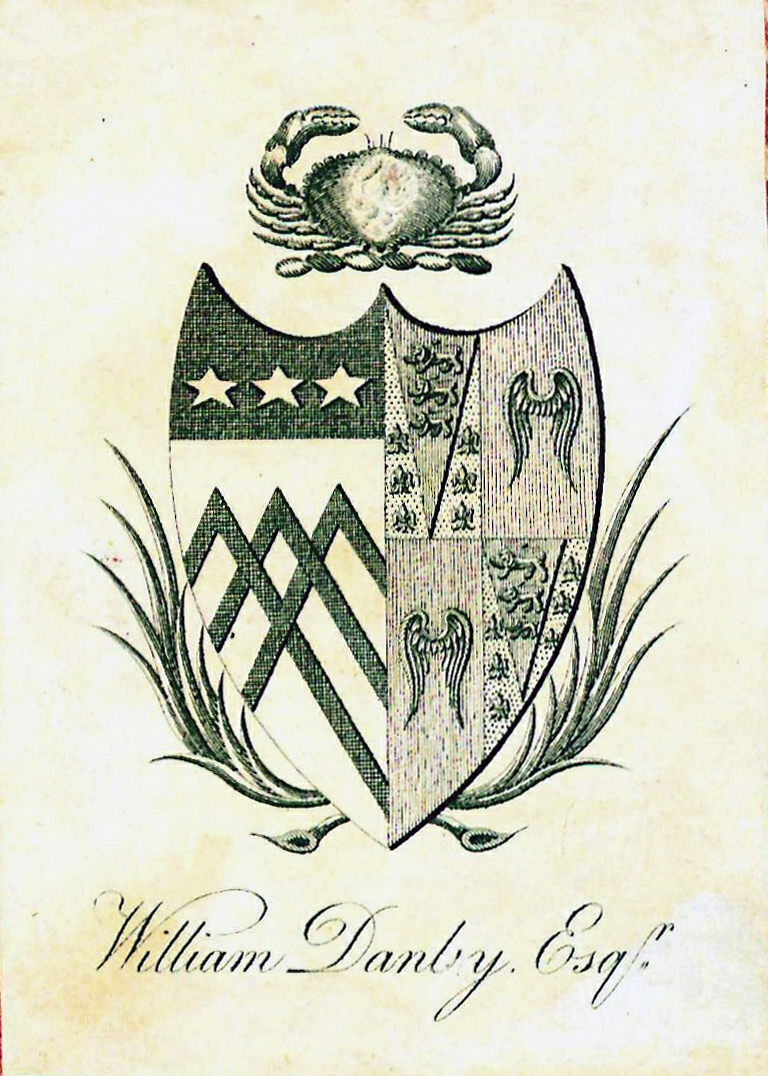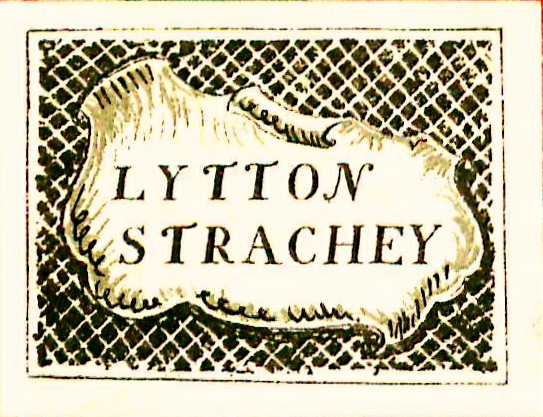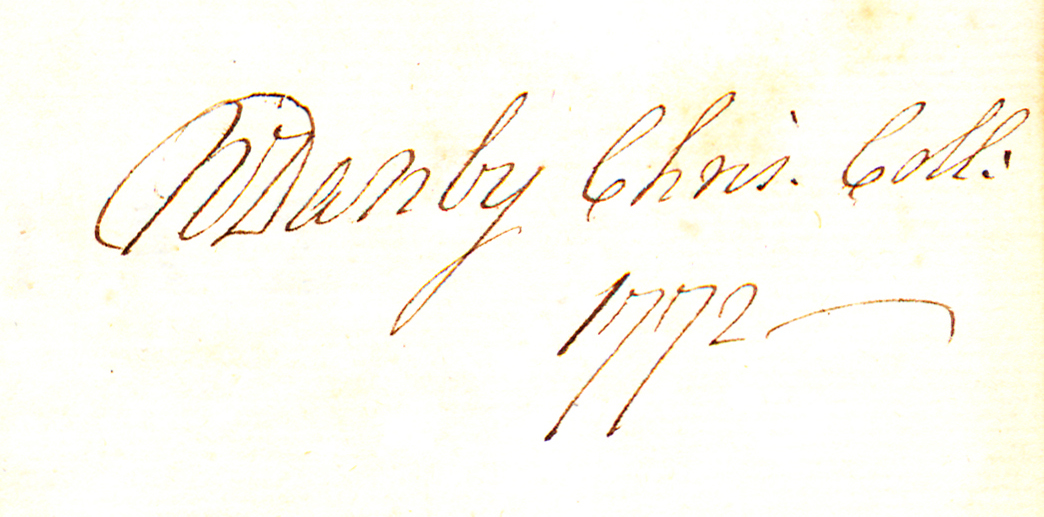Difference between revisions of "Homerou Iliados"
m (Lktesar moved page Homērou Iliados, Tēs tou Homērou Odysseias to Homērou Iliados without leaving a redirect: Separated Iliad and Odyssey) |
m |
||
| (26 intermediate revisions by 6 users not shown) | |||
| Line 1: | Line 1: | ||
| − | {{DISPLAYTITLE:'' | + | {{DISPLAYTITLE:''Των του Ομηρου Σεσωμενων Απαντων ΤομοιΤεσσαρες''}} |
===by Homer=== | ===by Homer=== | ||
| − | {{ | + | __NOTOC__ |
| + | {{BookPageInfoBox | ||
|imagename=Tēs tou Homērou Iliados.jpg | |imagename=Tēs tou Homērou Iliados.jpg | ||
| − | |link=https:// | + | |link=https://wm.primo.exlibrisgroup.com/permalink/01COWM_INST/g9pr7p/alma991021830259703196 |
| − | |shorttitle=Homer | + | |shorttitle=Tēs tou Homērou Iliados |
| − | | | + | |author=[[:Category:Homer|Homer]] |
| − | + | |editor=[[:Category:James Moor|James Moor]] and [[:Category:George Muirhead|George Muirhead]] | |
| − | | | + | |publoc=[[:Category:Glasgow|Glasguae: ]] |
| − | | | + | |publisher=In aedibus Academicis, Excudebant R. et A. Foulis |
| − | | | + | |year=1756 |
| − | | | + | |lang=[[:Category:Greek|Greek]] |
| − | }} | + | |set=2 volumes in 1 |
| − | + | |desc=[[:Category:Folios|Folio]] (34 cm.) | |
| − | + | |shelf=N-5 | |
| − | + | }}{{BookPageBookplate | |
| − | + | |imagename=DanbyBookplatefromHomer.jpg | |
| − | Little is known about the life of Homer | + | |display=left |
| − | + | |caption=Bookplate of William Danby, front pastedown. | |
| − | + | }}Little is known about the life of Homer, the poet responsible for the ''Iliad'' and the ''[[Homerou Odysseias|Odyssey]]''. Herodotus claimed Homer lived around 850 BCE, while modern scholars usually date his poems to the second half of the eighth century BCE.<ref>[http://www.oxfordreference.com/view/10.1093/acref/9780199548545.001.0001/acref-9780199548545-e-1550 "Homer”] in ''The Oxford Companion to Classical Literature'', ed. by M.C. Howatson (Oxford: Oxford University Press, 2011).</ref> The Trojan War is estimated to have occurred at the end of the Mycenaean Age in Greece, around 1200 BCE, meaning that Homer was looking back four centuries to a heroic world much greater in his esteem, than the contemporary world. Homer relied on oral history to compose his poems; this provides some of the basis for the "separatist" view that the two epic poems were not written by the same person, but possibly by a combination of poets. The mixed dialect of Ionian Greek in which each poem was originally written indicates that both poems were written in the east Aegean. This is supported by contextual clues in the poems themselves. The two most plausible locations for the birth of Homer are Smyrna and Chios, but ancient Greeks viewed the poet as a blind minstrel wandering while he composed the poems, which were sung or chanted, accompanied by a lyre. | |
| − | [http:// | + | Homer’s ''Iliad'' is an epic poem of a heroic or tragic nature, consisting of 24 books, all of which are original except for Book Ten, which was likely added later.<ref>[http://www.oxfordreference.com/view/10.1093/acref/9780192801463.001.0001/acref-9780192801463-e-1070 "Homer"] in ''Oxford Dictionary of the Classical World'', ed. by John Roberts (Oxford: Oxford University Press, 2007).</ref> It tells the tale of the wrath of Achilles during the last year of the ten-year Trojan War. The war began when Agamemnon led a unified force of Greek warriors across the Aegean Sea to attack Troy under the pretense of rescuing his sister-in-law, Helen (wife of Menelaus), from the Trojan prince Paris. Homer begins his narration in the tenth year of the war, covering several weeks during the war and focusing on the anger of Achilles at not being appropriately respected by Menelaus. Significantly described in the ''Iliad'' are the death of Patroclus (Achilles’ foster brother and alleged lover) and the subsequent vengeance killing of Hector (the oldest son of King Priam of Troy). The respect and compassion between supposed enemies Achilles and Priam when the former returns Hector’s body from the Danaan camp is an example of the humanity Greeks expected to be shown to one another even during war. The story ends with the funeral of Hector. Homer does not address the death of Achilles, the Trojan Horse or the fall of Troy. All of those stories come to us from the Latin poet Virgil’s epic, ''The Aeneid''. |
| − | + | {{BookPageBookplate | |
| + | |imagename=StracheyBookplatefromHomer.jpg | ||
| + | |display=left | ||
| + | |caption=Bookplate of Lytton Strachey, front pastedown. | ||
| + | }}==Evidence for Inclusion in Wythe's Library== | ||
| + | Listed in the [[Jefferson Inventory]] of [[Wythe's Library]] as "Homeri Ilias. Gr. 2.v. fol. Foulis" and given by [[Thomas Jefferson]] to [[Dabney Carr]]. Both the [https://digitalarchive.wm.edu/handle/10288/13433 Brown Bibliography]<ref> Bennie Brown, "The Library of George Wythe of Williamsburg and Richmond," (unpublished manuscript, May, 2012) Microsoft Word file. Earlier edition available at: https://digitalarchive.wm.edu/handle/10288/13433</ref> and [http://www.librarything.com/profile/GeorgeWythe George Wythe's Library]<ref>''LibraryThing'', s. v. "Member: George Wythe," accessed on June 27, 2013, http://www.librarything.com/profile/GeorgeWythe </ref> on LibraryThing include the 1756 Greek version of the ''Iliad'' published by the Foulis Press. The Wolf Law Library purchased the same edition. | ||
| − | == | + | ==Description of the Wolf Law Library's copy== |
| − | + | {{BookPageBookplate | |
| − | + | |imagename=SenhouseBookplateFromHomer.jpg | |
| − | + | |display=left | |
| − | + | |caption=Bookplate of Roger Senhouse, front pastedown. | |
| − | + | }}Bound in contemporary full diced brown calf with wide gilt tooled borders and five gilt stamped raised bands. Spines feature gilt lettered and elaborately gilt decorated and ornamented compartments. The edges are gilt-rolled. Includes the bookplates of [[wikipedia:William Danby|William Danby (writer)]], [[wikipedia:Lytton Strachey|Lytton Strachey]], and [[wikipedia:Roger Senhouse|Roger Senhouse]] on the front pastedown. Signature "W Danby, Chris. Coll. 1772" on front flyleaf. Part of combined set with [[Homerou Odysseias|Tēs tou Homērou Odysseias]]. Purchased from David Brass. | |
| − | ' | + | Images of the library's copy of this book are [https://flic.kr/s/aHsjMM2Xih available on Flickr]. View the record for this book in [https://wm.primo.exlibrisgroup.com/permalink/01COWM_INST/g9pr7p/alma991021830259703196 William & Mary's online catalog.] |
| − | + | [[File:DanbySignaturefromHomer.jpg|right|thumb|200px|<center>Inscription, front flyleaf.</center>]] | |
| − | |||
| − | == | + | ==See also== |
| − | + | <div style="overflow: hidden;"> | |
| − | + | *''[[Homeri Ilias]]'' | |
| − | + | *''[[Homerou Ilias kai Odysseia]]'' | |
| − | + | *''[[Homērou Odysseia]]'' | |
| − | + | *''[[Homerou Odysseias]]'' | |
| − | + | *''[[Iliad of Homer|The Iliad of Homer]]'' | |
| − | </ | + | *''[[Ilias kai eis Auten Scholia ton Palaion|Ilias kai eis Auten Scholia ton Palaion = Homeri Ilias et Veterum in eam Scholia, quae Vulgo Appellantur Didymi]]'' |
| + | *[[Jefferson Inventory]] | ||
| + | *''[[Odyssey of Homer|The Odyssey of Homer]]'' | ||
| + | *''[[Incerti Scriptoris Graeci Fabulae Aliquot Homericae de Ulixis Erroribus|Incerti Scriptoris Graeci Fabulae Aliquot Homericae de Ulixis Erroribus, Ethice Explicatae]]'' | ||
| + | *[[George Wythe Room]] | ||
| + | *[[Wythe's Library]] | ||
| + | </div> | ||
| − | + | ==References== | |
<references/> | <references/> | ||
| + | [[Category:George Muirhead]] | ||
[[Category:George Wythe Collection at William & Mary's Wolf Law Library]] | [[Category:George Wythe Collection at William & Mary's Wolf Law Library]] | ||
[[Category:Greek Literature]] | [[Category:Greek Literature]] | ||
| + | [[Category:Homer]] | ||
| + | [[Category:James Moor]] | ||
| + | [[Category:John Wayles Eppes' Books]] | ||
[[Category:Titles in Wythe's Library]] | [[Category:Titles in Wythe's Library]] | ||
| + | |||
| + | [[Category:Folios]] | ||
| + | [[Category:Glasgow]] | ||
| + | [[Category:Greek]] | ||
Latest revision as of 12:58, 30 November 2022
by Homer
| Tēs tou Homērou Iliados | |
|
Title page from Tēs tou Homērou Iliados, George Wythe Collection, Wolf Law Library, College of William & Mary. | |
| Author | Homer |
| Editor | James Moor and George Muirhead |
| Published | Glasguae: : In aedibus Academicis, Excudebant R. et A. Foulis |
| Date | 1756 |
| Language | Greek |
| Volumes | 2 volumes in 1 volume set |
| Desc. | Folio (34 cm.) |
| Location | Shelf N-5 |
Little is known about the life of Homer, the poet responsible for the Iliad and the Odyssey. Herodotus claimed Homer lived around 850 BCE, while modern scholars usually date his poems to the second half of the eighth century BCE.[1] The Trojan War is estimated to have occurred at the end of the Mycenaean Age in Greece, around 1200 BCE, meaning that Homer was looking back four centuries to a heroic world much greater in his esteem, than the contemporary world. Homer relied on oral history to compose his poems; this provides some of the basis for the "separatist" view that the two epic poems were not written by the same person, but possibly by a combination of poets. The mixed dialect of Ionian Greek in which each poem was originally written indicates that both poems were written in the east Aegean. This is supported by contextual clues in the poems themselves. The two most plausible locations for the birth of Homer are Smyrna and Chios, but ancient Greeks viewed the poet as a blind minstrel wandering while he composed the poems, which were sung or chanted, accompanied by a lyre.
Homer’s Iliad is an epic poem of a heroic or tragic nature, consisting of 24 books, all of which are original except for Book Ten, which was likely added later.[2] It tells the tale of the wrath of Achilles during the last year of the ten-year Trojan War. The war began when Agamemnon led a unified force of Greek warriors across the Aegean Sea to attack Troy under the pretense of rescuing his sister-in-law, Helen (wife of Menelaus), from the Trojan prince Paris. Homer begins his narration in the tenth year of the war, covering several weeks during the war and focusing on the anger of Achilles at not being appropriately respected by Menelaus. Significantly described in the Iliad are the death of Patroclus (Achilles’ foster brother and alleged lover) and the subsequent vengeance killing of Hector (the oldest son of King Priam of Troy). The respect and compassion between supposed enemies Achilles and Priam when the former returns Hector’s body from the Danaan camp is an example of the humanity Greeks expected to be shown to one another even during war. The story ends with the funeral of Hector. Homer does not address the death of Achilles, the Trojan Horse or the fall of Troy. All of those stories come to us from the Latin poet Virgil’s epic, The Aeneid.
Evidence for Inclusion in Wythe's Library
Listed in the Jefferson Inventory of Wythe's Library as "Homeri Ilias. Gr. 2.v. fol. Foulis" and given by Thomas Jefferson to Dabney Carr. Both the Brown Bibliography[3] and George Wythe's Library[4] on LibraryThing include the 1756 Greek version of the Iliad published by the Foulis Press. The Wolf Law Library purchased the same edition.
Description of the Wolf Law Library's copy
Bound in contemporary full diced brown calf with wide gilt tooled borders and five gilt stamped raised bands. Spines feature gilt lettered and elaborately gilt decorated and ornamented compartments. The edges are gilt-rolled. Includes the bookplates of William Danby (writer), Lytton Strachey, and Roger Senhouse on the front pastedown. Signature "W Danby, Chris. Coll. 1772" on front flyleaf. Part of combined set with Tēs tou Homērou Odysseias. Purchased from David Brass.
Images of the library's copy of this book are available on Flickr. View the record for this book in William & Mary's online catalog.
See also
References
- ↑ "Homer” in The Oxford Companion to Classical Literature, ed. by M.C. Howatson (Oxford: Oxford University Press, 2011).
- ↑ "Homer" in Oxford Dictionary of the Classical World, ed. by John Roberts (Oxford: Oxford University Press, 2007).
- ↑ Bennie Brown, "The Library of George Wythe of Williamsburg and Richmond," (unpublished manuscript, May, 2012) Microsoft Word file. Earlier edition available at: https://digitalarchive.wm.edu/handle/10288/13433
- ↑ LibraryThing, s. v. "Member: George Wythe," accessed on June 27, 2013, http://www.librarything.com/profile/GeorgeWythe




